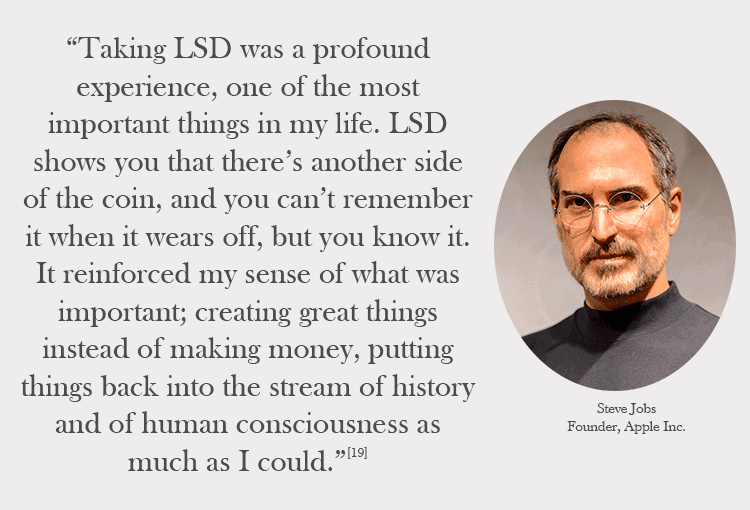
Human technology and innovation have continually reached new heights since man first went into space…what followed were the groundbreaking inventions of the modern computer, cell phones, drones and robotics — and yet something still seems to be missing...
There is a quiet voice in all of us that seems to say, “There’s still so much more to come!” And while many in the technology and science space today seem to think this will come through the invention of advanced artificial intelligence, there is another possibility: the modern revival of psychedelics.
Investing in the early stages of cannabis prior to legalization gave investors huge gains for those savvy enough to see the future. Early investing in psychedelics may present an even bigger opportunity; a final frontier of once considered taboo drugs now becoming mainstream.
When most of us hear about psychedelics and begin diving into the differences between LSD, psilocybin, ketamine, DMT (dimethyltryptamine), ayahuasca, salvia and the many other psychedelic compounds that exist, most think and speak from a place of ignorance.
While the 60’s and 70’s may have exposed the Western world to these compounds in high doses for the first time, the history and cultural impacts of these drugs is much more complicated and intriguing then many believe.

Many people today know LSD as the drug that inspired the Beatles as well as the Manson Family murderers, and seem to view the drug as equally terrifying and exotic.[1] While that is a very safe way of mentally addressing these compounds, there is a lot of ignorance and inaccuracy behind that viewpoint.
To fully understand what is happening with today’s psychedelic renaissance and what is making large scale pharmaceutical companies like Johnson and Johnson (NYSE: JNJ) receive FDA approval for a chemical cousin of ketamine,[2] or have companies like Mind Medicine (MindMed) Inc. (NEO: MMED / OTCQB: MMEDF) go public on the NEO for their research in a chemical cousin of Ibogaine, we have to consider the history of these compounds and their impacts on religion and human culture as well as look at the gateway drug that is driving this modern revival: cannabis.[3]
It’s been a long running piece of anti-drug propaganda that cannabis is “the gateway drug” to other more damaging and dangerous substances.
While there is little to no scientific data to support these claims as the last 40 so years of drug reform policy and academic study have shown, there is now a growing connection between the cannabis industry being the “gateway” to other more alternative medicines that the medical community has either dismissed or been forced to abandon due to outdated government drug policies.
With Canada legalizing cannabis in 2018, becoming the first G7 nation to do so, the floodgates have been metaphorically opened. And while many early skeptics of cannabis were focused on the impact its mainstream adoption would have on overall health, job productivity, and society as a whole, many weren’t looking at the long game which is only just beginning to play out.
Through the legalization of the cannabis industry, we have seen a mass intake of funding for general plant science that is unprecedented in modern history. What began with our simple understanding of the two mainstay cannabinoids, THC and CBD, has blossomed into a wealth of knowledge of many micro-cannabinoids and our very own endocannabinoid systems.

“The complexity of the endocannabinoid (eCB) system is becoming better understood and new drivers of eCB signaling are emerging. Modulation of the activities of the eCB system can be therapeutic in managing or treating a number of diseases.
Research into the eCB system has been paralleled by the development of agents that interact with cannabinoid receptors. In this regard it should be remembered that herbal cannabis contains a myriad of active ingredients, and the individual cannabinoids have quite distinct biological activities requiring independent studies.”[4]
This new wealth of knowledge in plant sciences really began to gain traction and affect the public perception of the cannabis industry when the FDA “approved the Epidiolex (cannabidiol) [CBD] oral solution for the treatment of seizures associated with two rare and severe forms of epilepsy... This was the first FDA-approved drug that contains a purified drug substance derived from marijuana.”[5]
Developed by GW Pharma (NASDAQ: GWPH), this product was the first real proof of concept for these micro cannabinoids being utilized for more than just pain management. It also showed that with advanced understanding and research funding, there is much larger medicinal potential for cannabis as well as for other plants that may have been previously undervalued.
While cannabis has been a major contributing factor to an easing of drug legislation and reform — slowly turning the tides of public and political stigmas and re-educating the medical community on the serious potential of alternative medicines — a combination of other small factors and coincidental timing have also helped lead to today’s psychedelic revolution.
COVID-19 may have shaken many of the modern world’s foundations from faith in government to job security. While many serious negative impacts have come from this pandemic, both the cannabis industry and the psychedelic industry have been able to benefit and advance during this crisis.
Cannabis businesses, many of which were on the ropes after a difficult 2019 financial year, saw a huge increase in sales over the last few months as well as a rapid evolution of the online and delivery side to the industry.
Of course not all companies were able to remain open during the pandemic, and many suffered in oversaturated markets such as California. But this much-needed cleanse and reshuffling of the industry has now begun to bear fruit with new product launches, better delivery and pickup infrastructure, and hopefully an end to the overinflated/debt-ridden business practices that have kept investors wary of the industry thus far.
For the psychedelic industry, which is just beginning its development phase, COVID-19 created a far richer opportunity to gain public support and quietly move ahead with legislative reform.
“The COVID-19 pandemic is likely to create one of the greatest mental health challenges the world has ever seen,” executive chairman of Field Trip Psychedelics, Ronan Levy, said in an interview with BioTuesdays.
“There isn’t a person on the planet that isn’t feeling anxiety over having their life taken away from them by this quarantine and whether they’ll have a job to go to when we return to a new normal,” he suggests.[6]
Founded by early players in the medical cannabis industry in Canada, Field Trip has become a leading player in the medical and therapeutic applications of psychedelics such as ketamine and psilocybin, or magic mushrooms, which are currently controlled substances but can be used medically in certain situations or approved applications.
Many other companies entering this space have made similar statements regarding the psychological needs of the many who have remained isolated during this pandemic as well as the needs of those who already struggle from PTSD, depression, anxiety and other mental ailments.
While the new psychedelic industry has been pushing their agenda through research and by influencing policy makers, there has also been a significant media storm now actively embracing psychedelics, which is well timed with many people spending more time at home and hungry for new content.
It began in 2019 with “The Medicine,” a documentary focused on the spiritual benefits and medical potential of ayahuasca that had a limited release in February with an expected stream release this coming July.[7] This small-scale documentary would become one of many to come, all focusing on different psychedelic compounds and all taking a different cinematic approach.

This season of “Billions,” an American fictional television series about a Wall Street hedge fund manager, began with an ayahuasca session and has continued along the theme of trying to produce some sort of mental stimulus drug through using ayahuasca or other psychedelic compounds in small doses.
Netflix (NASDAQ: NFLX) released “Have a Good Trip: Adventures in Psychedelics” in May which featured a handful of actors, comedians, musicians and artists all discussing their favorite psychedelic experiences and preaching safe usage of these compounds.[8]
There is also “RecConnect,” London Real’s fifth feature-length documentary film that documents Brian Rose’s journey to Costa Rica where he participates in multiple ceremonies with ayahuasca. The movie stars Graham Hancock, Dr. Jordan Peterson, Dennis McKenna, Sadhguru, Dorian Yates, Dr. Gabor Mate, Dr. Joe Dispenza, Michael Pollan, and Dan Pena.[9]
Not only is there growing acceptance and support from traditional and non-traditional media combined with a global need for some form of psychological medication, but the COVID-19 pandemic has also helped to drive the conversation of psychedelics and other plant medications in one other way — it has resulted in a massive revival of gardening and appreciation of nature.
While the reasoning for this massive influx of gardeners may not be the most comforting, this is bringing solace to those exercising their green thumbs.
According to Cheney Creamer, chair of the Canadian Horticultural Therapy Association, “gardening can offer families countless mental health benefits during the COVID-19 crisis.”[10]
This combination of home gardening and reconnecting with our natural world is perfectly synchronized with the advancements of the psychedelic industry, which is why this industry is looking to take off even faster than its cannabis predecessor.
Through this combination of fortuitous events, the validation of the psychedelics industry is now within reach with many speculating some form of legalization within the next two years.
That is an incredibly short timeframe, especially when we compare it to the long drudge towards cannabis legalization, which is still very much in its infancy with regards to global acceptance and scale of industry.
Another key difference here is the heavy interest from large scale pharmaceutical companies, something we saw much less of by comparison for cannabis, which was discussed in a recent virtual conference hosted by the Canadian Securities Exchange (CSE) and continued in the “Invest in Psychedelics” CSE TV series. During several of the panel discussions it was mentioned that this is primarily due to the form and function of psychedelics when compared to cannabis.[11]
Cannabis is as much an agricultural enterprise as it is pharmaceutical, with a large portion of the industry heavily focused on production and extraction. When we compare this to psychedelics like psilocybin mushrooms, LSD, ketamine, DMT and MDMA, there aren’t the same cultivation requirements; and there are a lot of synthetic and lab control options when it comes to manufacturing these compounds.
This is very much in line with how we’ve seen the pharmaceutical and biotech sectors work for the last 40 to 60 years, which allows for much easier entry for pharmaceutical companies and also much more understandable business metrics when compared to the pharmaceutical sector.
Not only is this industry a much simpler transition for most pharmaceutical companies but psychedelics as an industry also has the advantage of hindsight — seeing what canna-businesses did wrong with their own plant-based wellness products that had a recreational side to it which tended to scare off serious investors. One major lesson learned. It was also a rush to get product onstream without the proper business fundamentals in place to achieve early profitability.

The psychedelics business today is strictly about treating mental health — a serious problem around the world. According to a 2019 report from the Centers for Disease Control and Prevention, nearly 25 million adults have been taking antidepressants for at least two years, representing a 60 percent increase since 2010.[12]
Doctors want better therapies, and psychedelics could fit the bill. The total market for psilocybin could be $34 billion by 2024, according to FN Media Group.”[13]
All of these factors are giving many hope that these drugs will be legalized in some fashion very soon or at the very least decriminalized at many State or Federal levels to come.
"When it comes to psychedelics, there are many parallels with the movement to legalize cannabis. In both cases, education is paramount," said Adriana Waterston, Green Horizon's SVP of Insights and Strategy, in a press release.
"Psychedelics, like cannabis, have been tied to a negative, highly stigmatized image for many years. Science, however, is showing us that psychedelics demonstrate tremendous promise for certain chronic psychological illnesses, even those that have been treatment-resistant. As we continue to study psychedelics and evidence for their benefits mounts, we can expect support for legalization to follow."[14]
So now that we know the psychedelic industry is much more a question of when, not if, who are the companies already stepping into the sector and looking to lead the way?
Revive Therapeutics Ltd. (CSE: RVV / OTC US: RVVTF) arrived on the psychedelic scene around February 2019, having announced that it had entered into a supply and collaboration agreement with Red Light Holland Financing Inc. (CSE: TRIP / OTC US: TRUSS), an arm’s length party, as well as acquiring all of the issued and outstanding securities of Psilocin for an aggregate purchase price of $2.75 million.
“Revive is excited to be working with Red Light to explore the use of its delivery technology with unique products such as truffles,” stated Michael Frank, President of Revive. “We are confident that the results of Revive’s research will highlight the versatility of its cannabinoid delivery platform.”
Most recently, Revive announced an expansion to the sponsored-research partnership agreement with the University of Wisconsin-Madison to evaluate novel formulations of psilocybin and a Phase 1 clinical study investigating the therapeutic application of psilocybin for an undisclosed addiction use disorder. The University holds a Wisconsin special authorization and DEA license to perform clinical research with psilocybin.
“We are pleased to have expanded our research partnership with the University of Wisconsin-Madison in the development of novel psilocybin formulations that will serve as the platform to create unique psychedelic-based therapeutics for clinical research targeting specific medical needs, such as addiction use disorders,” said Michael Frank, Revive’s Chief Executive Officer.

Another major player within the psychedelic space is Mind Medicine (MindMed) Inc. (NEO: MMED / OTCQB: MMEDF).
The company announced on May 11 that “it had entered into a clinical trial agreement with Maastricht University to undertake a Phase 2a clinical trial for lysergic acid diethylamide (LSD) in adult patients with Attention Deficit Hyperactivity Disorder (ADHD). As part of the agreement, Maastricht University will provide facilities and personnel for the Phase 2a Proof of Concept trial for MindMed’s multicentre, randomized, double-blind, placebo-controlled trial evaluating the safety and efficacy of low dose LSD as treatment for ADHD in adults.”[15]
“While initiation and subsequent advancement of the study is still in its infancy (we expect trials to begin in Q4 2020), the news carries positive ramifications. In essence, MindMed will become the only pure play exchange-traded North American psychedelics company to conduct Phase 2 trialing on a psychedelic compound.”
“That sets MindMed apart as the de facto standard bearer for psychedelic research and development among investable public companies.”

“Above all, the Phase 2a trial will heighten visibility and provide catalysts for which investors can better quantify upcoming advancements. While its competitors are mostly scrambling to purchase extreme early-stage psychedelic assets with vague and unproven therapeutic potential, MindMed will be conducting controlled (randomized, double-blind, placebo-controlled) trials with verifiable targets and endpoints. In turn, this will give investors a structured roadmap of benchmarks to evaluate.”
What could become an enormous IPO in the psychedelic sector is Peter Thiel-backed Compass Pathways (NASDAQ: CMPS). The United Kingdom-based mental healthcare company, in which Thiel owns a 7.54% stake, said it plans to list its American depositary shares on the NASDAQ under the ticker "CMPS." It plans to use proceeds to fund clinical trials for its depression therapy that uses the psychoactive compound psilocybin, born from mushrooms.
Thiel is a co-founder of PayPal and was Facebook's first major investor (NASDAQ: FB).
Earlier this year, Compass Pathways obtained a U.S. patent for a psilocybin therapy protocol for treating patients with depression.
Psilocybin is the ingredient that gets people high when they over-consume magic mushrooms.
The company stated that the psychedelic agent was "well tolerated when administered to healthy adult volunteers with support from specially trained therapists in a randomized placebo-controlled trial." What this means is micro-dosing, under a controlled environment.[16]
In 2018, the U.S. Food and Drug Administration gave it “breakthrough therapy” status, expediting the development process. Investors need to keep tabs on this leading company as a whole, as the psychedelic investment sector is in the beginning stages and could become even bigger than marijuana.

Delic Holdings Inc (OTCQB: DELCF / CSE: DELC) was formed in 2019 to address the growing interest in psychedelic science. Delic was the first psychedelic umbrella media platform and is currently a trusted source for those interested in psychedelic science. Delic's offerings include "The Delic," an e-commerce lifestyle brand, "Reality Sandwich," a free public education platform providing psychedelic guides, news and culture, and "Meet Delic," a proposed biannual psychedelic wellness summit.
Delic recently went public on the Canadian Securities Exchange, and plans to list in the U.S. shortly after. This is an equally interesting opportunity when compared to Compass Pathways (mentioned above), as Delic’s Board of Directors are the Who’s Who in the cannabis and major banking sectors.[17]
We are keeping a keen eye on this junior company, as we view this as “best of breed” in the early stages of this upcoming psychedelic investment sector. Be sure to subscribe to FNN (if you haven’t already) to stay on top of the Psychedelics space and be first to receive information on new and exciting companies in this fast-growing industry.
Of course there are also the big players like Johnson and Johnson (NYSE: JNJ), mentioned above for their FDA approval of Spravato, who may end up performing a similar role as GW Pharma served for the cannabis and CBD space by acting as a “safe bet” to shore up investor confidence in the sector and help reduce skepticism from the medical and political sphere.
Not only are psychedelics showing promise as FDA-designated “breakthrough therapies,” but they may also be key to expanding consciousness through scientific discoveries on how these substances interact with the brain. The accelerated progress of these studies have just created unprecedented investment opportunities with the industry’s leading companies going public this year. Psychedelics are providing hope for millions with the potential to treat mental health disorders.
With corporate and public interests aligning to bring about the next global psychedelic revolution, what does our future look like?
Through some of the research coming out of Johns Hopkins University, we are just beginning to realize not only the medicinal and therapeutic potentials of these compounds, but also expanding our very knowledge of consciousness itself.
“Perhaps no region of the brain is more fittingly named than the claustrum, taken from the Latin word for "hidden or shut away." The claustrum is an extremely thin sheet of neurons deep within the cortex, yet it reaches out to every other region of the brain. Its true purpose remains "hidden away" as well, with researchers speculating about many functions. For example, Francis Crick of DNA-discovery fame believed that the claustrum is the seat of consciousness, responsible for awareness and sense of self.

What is known is that this region contains a large number of receptors targeted by psychedelic drugs such as LSD, ketamine or psilocybin, three-fourths the hallucinogenic chemical found in certain mushrooms.
To see what happens in the claustrum when people are on psychedelics, Johns Hopkins Medicine researchers compared the brain scans of people after they took psilocybin with their scans after taking a placebo.
Their findings were published online on May 23, 2020, in the journal NeuroImage. The scans after psilocybin use showed that the claustrum was less active, meaning the area of the brain believed responsible for setting attention and switching tasks is turned down when on the drug. The researchers say that this ties in with what people report as typical effects of psychedelic drugs, including feelings of being connected to everything and reduced senses of self or ego.
"Our findings move us one step closer to understanding mechanisms underlying how psilocybin works in the brain," says Frederick Barrett, Ph.D., Assistant Professor of Psychiatry and Behavioral Sciences at the Johns Hopkins University School of Medicine and a member of the school's Center for Psychedelic and Consciousness Research. "This will hopefully enable us to better understand why it's an effective therapy for certain psychiatric disorders, which might help us tailor therapies to help people more."[18]
Now while the science and business surrounding this industry is still heavily focused on the medical side it’s hard not to let the imagination wander with thoughts of how micro-dosing psilocybin, ketamine therapy or LSD could impact engineering, physics, art, chemistry, and culture if permitted to be “normalized” in society. What would the world look like if everyone’s favorite vice was no longer cigarettes or alcohol but instead LSD, Ketamine and magic mushrooms?
Some have speculated that without the surge of micro-dosing in Silicon Valley over the last 30 to 40 years, the tech space wouldn’t have progressed as far as it has. This is supported by one of the most influential tech CEOs of our time, Steve Jobs, who frequently discussed the benefits of LSD when it comes to expanding ideas and creativity.

The impact of this industry as a whole is still far from set, and while many have seen how much cannabis legalization has impacted culture, medicine and local and global economies, the psychedelic industry looks poised to dwarf this impact over time. Humanity is about to embark on one hell of a trip (no pun intended). This early interest in the psychedelic market could represent or equate to early positions found five years ago in cannabis. Get ready for big moves in the psychedelics space to come!

Dawn Van Zant, Contributor
for Investors News Service
P.S. To discover more opportunities in the hottest sectors in North America, sign up now to the Financial News Now newsletter to get the latest updates and investment ideas directly in your inbox!
DISCLAIMER: Investing in any securities is highly speculative. Please be sure to always do your own due diligence before making any investment decisions. Read our full disclaimer here.
[1] https://www.rollingstone.com/music/music-news/beatles-acid-test-how-lsd-opened-the-door-to-revolver-251417/
[2] https://www.marketwatch.com/story/fda-approves-johnson-johnsons-ketamine-like-drug-to-treat-severe-depression-2019-03-05
[3] https://filtermag.org/psychedelic-research-public-canada/
[4] https://www.tandfonline.com/doi/abs/10.1080/17512433.2017.1292849
[5] https://www.fda.gov/news-events/press-announcements/fda-approves-first-drug-comprised-active-ingredient-derived-marijuana-treat-rare-severe-forms
[6] https://biotuesdays.com/2020/05/12/covid-19-presents-opportunities-and-challenges-for-field-trip-psychedelics/
[7] https://themedicinedocumentary.com/
[8] https://www.netflix.com/ca/title/80231917
[9] https://londonreal.tv/reconnect-the-movie/
[10] https://globalnews.ca/news/6849485/growing-garden-nature-coronavirus-covid-19/
[11] https://www.youtube.com/watch?v=QUI5n4vWpNU
[12] https://www.hopkinsmedicine.org/news/articles/esketamine-a-new-approach-for-patients-with-treatment-resistant-depression
[13] https://www.prnewswire.com/news-releases/5-biotech-trends-to-follow-in-2020-301052331.html
[14] http://www.greenhorizonsinsights.com/insights/research-shows-desire-for-psychedelics-market-is-strong/
[15] https://www.mindmed.co/news-posts/mind-medicine-becomes-1st-exchange-traded-psychedelics-company-to-begin-phase-2a-trials
[16] https://www.bnnbloomberg.ca/magic-mushroom-drug-backer-compass-pathways-files-for-u-s-ipo-1.1486519
[17] http://www.globenewswire.com/news-release/2020/08/31/2086510/0/en/Delic-Corp-and-Molystar-Resources-Announce-Letter-of-Intent-to-Complete-Business-Combination-Transaction-and-Closing-of-Oversubscribed-Subscription-Receipt-Private-Placement.html
[18] https://www.sciencedaily.com/releases/2020/06/200605121512.htm
[19] https://www.goodreads.com/quotes/542554-taking-lsd-was-a-profound-experience-one-of-the-most
